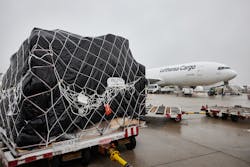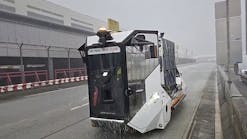Lufthansa Cargo is the First Airline to Consistently Use Lightweight Transport Nets for Freight Pallets
Starting in January 2023, Lufthansa Cargo will use new, lighter transport networks to secure cargo pallets. By using a special fiber, the new nets save more than 50 percent in weight compared to conventional nets. This saves weight on every flight and thus significantly reduces CO2 emissions. Lufthansa Cargo is the first airline to use the lightweight nets for an entire pallet type. The cargo airline is thus once again taking a consistent step toward greater sustainability.
"For us, the use of lightweight transport nets is another step on the path to reducing CO2emissions. We have set ourselves the ambitious goal of halving our CO2emissions per kilogram when flying by 2030. To achieve this, we need to take action on many fronts. Every measure counts. One of them is reducing the weight of our loading equipment", says Dorothea von Boxberg, chairman of the executive board and CEO of Lufthansa Cargo AG. "We are transporting goods all over the world - and are at home all over the world. That's why global responsibility and sustainable, forward-looking action are part of our DNA. Our goal for 2050 is to be 100 percent CO2-neutral in the air; on the ground, we want to have achieved this goal as early as 2030."
Reduced CO₂ Footprint by 440 Tons Per Year
The innovative nets “Pallet Net Zero” made by AmSafe Bridport, which Lufthansa Cargo will be using through its subsidiary Jettainer, weigh between nine and eleven kilograms, which is less than half the weight of a conventional net made of polyester fibers. The weight reduction of the new nets is largely achieved by the high tensile strength of the special fiber, which is also made from renewable raw materials. The reduced weight of the transport nets saves Lufthansa Cargo around 140 tons of fuel and thus a good 440 tons of CO2 per year, another example of sustainability in action. At the same time, the nets are easier to handle without compromising on the technical requirements that are so important for flight safety.





